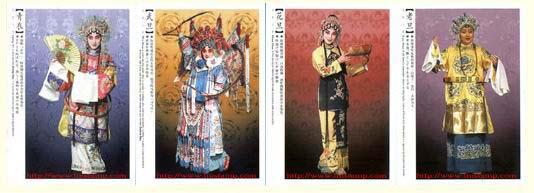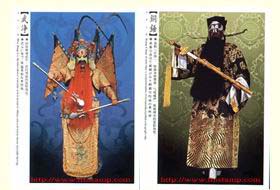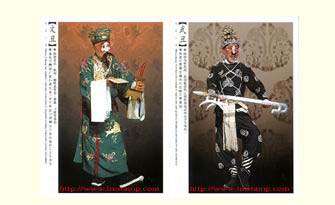Roles in Peking Opera
In Peking Opera, there are four roles: the male and female roles, the painted-face role, and the comedic role. These roles have the natural features of age and sex, as well as social status, and are artificially exaggerated by makeup, costume and gestures.
Sheng
 |
|
Lao Sheng and Xiao Sheng |
Sheng, a male role, usually a leading one, dates back to Southern Dramaof the Song and Yuan Dynasties (960-1368). This role appears in operas in all historical periods. According to the age and social status of the characters,Shengfalls into five sub-groups:Laosheng, Xiaosheng,Wusheng, Hongsheng and Wawasheng(characters of children).
Laoshengis also known asXusheng, meaning bearded, because the actors wear artificial beards, as they are middle-aged or elderly men. Most are upright and resolute characters. They sing in their natural voices, and their actions are serious ones.
Xiaoshengis a sub-category ofShengrepresenting young male characters. They don't wear artificial beards. They always sing in their real voices, while inKunquandPihuangoperas the singing mixes natural and falsetto voices.
Wushengstands for all of the male characters who appear in battle scenes. They are further subdivided intoChangkao Wuheng,Duanda Wusheng, Goulian Wusheng and Houxi Wusheng.They always wear helmets and thick-soled boots. The generals always carry long pikes.Wushengroles call for sturdy and vigorous actions, with resounding declamations. The movements of the waist and legs are powerful, and a high level of martial arts skills is demanded in these roles.Duanda Wushengroles use short-handled weapons, and their movements are light and swift.
Dan
 |
|
Qing Yi, Wu Dan, Hua Dan,and Lao Dan |
Qing Yi, Wu Dan, Hua Dan,and Lao Dan
The dan (female role) is divided into qing yi, wu dan, and hua dan, respectively representing: a middle-aged woman who always acts as a Mrs or Miss from a noble family; a woman who can fight; and a young girl who serves as a maid.
Qing yi was the main Dan role in the Northern Zaju.Qing yi refers to young or middle-aged women with gentle and refined dispositions. Most of Qing Yi's lines are delivered in song, and even the spoken parts are recited in rhythmic style.
Huadan is a role for a vivacious maiden, a young woman with a frank and open personality, or a woman of questionable character.
Wudan refers to female characters skilled in the martial arts and can be subdivided intoDaomadan and Wudan,according to the social positions and skills represented.Daomadan is good at using pikes and spears, and at riding horses.Wudan always wears short robes and the role emphasizes acrobatics.Wudan plays gods and ghosts and has excellent fighting skills.
Laodan usually represents aged women. He/She sings in their natural voices, in a style similar to that ofLaoshengbut in milder tones. In some types of opera,Laodanis calledFudanorBodan.
Caidan, also calledChoudan, represents clownish and cunning females. The performance of this part calls for exuberance.
Jing
|
 |
The jing (painted-face role) means all kinds of painted-faces and acts as the male role that has a particular personality or appearance.
TheJingrole originates from theFujingrole of the SongZaju. TheJingroles gradually increased in number, and became further divided into several groups, according to the different social positions and characters of the roles.
Dahualianwith a fully painted face is known asZheng Jing. The roles represent men of high social standing and good behavior, often court ministers.Zheng Jingsings in vigorous and sturdy tones.
Erhualian, also known asFu Jing, has powerful bodily movements and sturdy singing voices. Some roles in this group represent rascally ministers, recognizable by their white faces.
Wu'er Hualianis also known asWu Jing.This role is more physical than most of the others, with little singing or reciting.
You Hualian, also known asMao Jing, is a clownish role. Some of You Hualianroles have special skills, such as spouting fire from the mouth or baring the teeth.
Chou
 |
The chou (comic face which means clown) always acts as a wise and funny folk chivalrous man, or a man who has low social status.
TheChouroles originated in Southern Dramaof the Song and Yuan dynasties (960-1368) and appear in various kinds of operas. They portray various kinds of characters, some are warm-hearted, simple and sincere, and some are sinister and mean.
In modern operas, the performance ofChouroles has developed rapidly, and different operas have their own styles. In general, theChouroles do not focus on singing, but the dialogue is clear and fluent. According to the social positions, characters and skills demanded, theChouroles are divided into two categories:Wenchou(civilian) andWuchou(martial). Both have their own special features.
Wuchouis also known asKai Kou Tiao. It requires not only a good command of the martial arts or acrobatics, but also the ability to deliver the lines both clearly and fluently. The movements should be light and powerful.
The mo role also belongs to the lao sheng category, except that he is much older and a scatterbrain with a low social status. In this role, the actor puts a small dot of whitening on the nose when putting on make-up. He is commonly called a clown due to the besmirched, multicolored, clown face that is generally known as "three painted-faces."
















